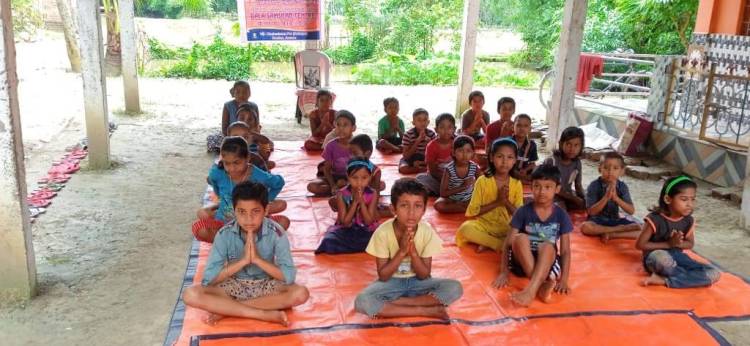[GHHF] Bala Samskar Kendras in Assam – Students learned about the importance of Guru Purnima, Celebrated and received blessings from Parents.
 Sant Tukaram says:
Sant Tukaram says:
If you have faith in the Guru’s feet,
If you have deep feeling for Guru’s feet,
If you imbibe the state of the Guru,
Then you don’t have to look for God.
God will come looking for you.
Global Hindu Heritage Foundation is very happy to inform that about 20 Bala Samskar Kendra students learned about the importance of Guru Purnima and took the blessings from their Gurus – Parents and Teachers.
Guru Purnima (Poornima) is a religious Hindu festival dedicated to offering respect to all the spiritual and academic gurus. It is celebrated as a festival in India, Nepal and Bhutan by Hindus, Jains and Buddhists. This festival is traditionally observed to honor one's chosen spiritual teachers or leaders. It is observed on the full moon day (Purnima) in the month of Ashadha (June–July) according to the Hindu Calendar. It is also known as Vyasa Purnima, for it marks the birthday of Veda Vyasa, the sage who authored the Mahabharata and compiled the Vedas.
Veda Vyasa is also called as “Krishna Dwaipayana,’ “Vasishta Krishna”, “Badarayana”, “Satyavathi Sutha” and “Parashara putra.” He was called as Krishna Dwaipayana. When he was born, Veda Vyasa’s complexion was dark and therefore he was referred as Krishna. Since he was born on one of the islands (Dweepas) of Yamuna River, he was referred as Dwaipayana. Hence, he is known as Krishna Dwaipayana. He is known as Badarayana since the island where he was born was covered with Badara (Indian jujube) trees. Because of his unsurpassing effort to compile the Vedas into four – Rig, Yajur, Sama and Atharvanaveda, he is referred as Veda Vyasa. It is said in Srimad Bhagavatam (1.3.21), “Thereafter, in the seventeenth incarnation of Godhead, Sri Vyas deva appeared in the womb of Satyavathi through Parashara Muni, and he divided the one Veda into several branches and sub-branches, seeing that the people in general were less intelligent.” His contribution is acknowledged in many scriptures. Gita Dhyana recognized his role to our cultural heritage: “Salutations unto thee, O Vyasa, whose intellect is vast, whose eyes are as large as the petals of a full-blown lotus, by whom was lighted the lamp of wisdom, full of the Mahabharata oil (essence).”
Vyasa is being described as Chiranjeevi, an immortal being still alive only to safeguard the humanity. He decided to remain on earth only for the welfare of mankind till the end of Kaliyuga. He is providing guidance to the most highly elevated spiritual leaders.
Significance of Guru Purnima
On this day, all spiritual aspirants and devotees worship Vyasa in honor of his divine personage and all disciples perform a 'puja' for their respective spiritual preceptor or Gurus. Hence, as per the tradition, we are participating in the worship of our Guru’s feet.
We always recognize our parents as our Gurus as per our tradition. We say, Matru Devo Bhava, Pitru Devo Bhava, Acharya Devo bhava and Athidhi devo bhava.
Since Hindus attach so much importance for the self-development, self -improvement and self-realization, spiritual Gurus play a dominant role in shaping and channeling the devotees to the path of spirituality. In fact, Gurus are often equated with God and always described as a link between the mortal individual and the Immortal God. In some cases, the Gurus are placed at even higher level than Gods.
The day of Guru Purnima is the day when all express our gratitude to our Gurus and Parents recommit our faith, rededicate our commitment to progress spiritually, do our part of seva, and receive his blessings. Guru Purnima is also considered an especially beneficial day to practice yogic Sadhana and meditation. The next six months following Guru Purnima in Ashada masa are considered the best time to study, evolve and experience the innate divine quality in a human being. These months are considered more suitable to receive the cosmic energy. During these celebrations, let us remember the most important verse in Guru Gita:
Dhyaana moolam guror murtih; Pooja moolam guror padam;
Mantra moolam guror vakyam; Moksha moolam guror kripa.
"The Guru's form should be meditated upon; the feet of the Guru should be worshipped; his words are to be treated as a sacred Mantra; his Grace ensures final liberation". It is a known fact that many Indians believe that the Guru is the only guarantee for the individual to transcend the bondage of sorrow and death and experience the Consciousness of the Reality.
DONATIONS
PayPal Method: To donate visit our website: savetemples.org. Click on the Donate button, then press the Purpose category, and select the General Donation category.
By Check: Or you can send a check payable to: GHHF, 14726 Harmony Lane, Frisco TX 75035. It is tax-deductible.
By Zelle: ghhfusaorg@gmail.com
By Rupees, please contact us by either phone or email.
For more information, call Prakasarao V Velagapudi (601-918-7111); Email: ghhfusaorg@gmail.com





















 Urgent support needed for Bangladesh Hindus
Urgent support needed for Bangladesh Hindus 







